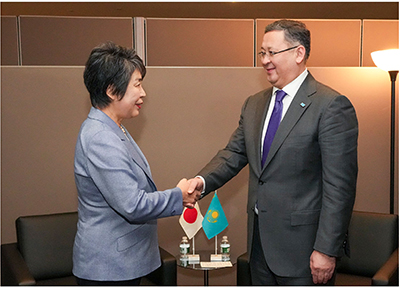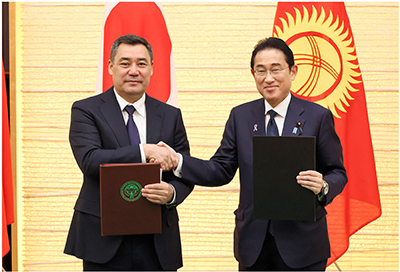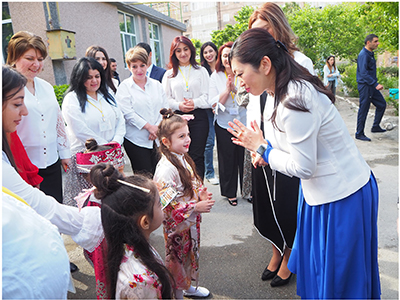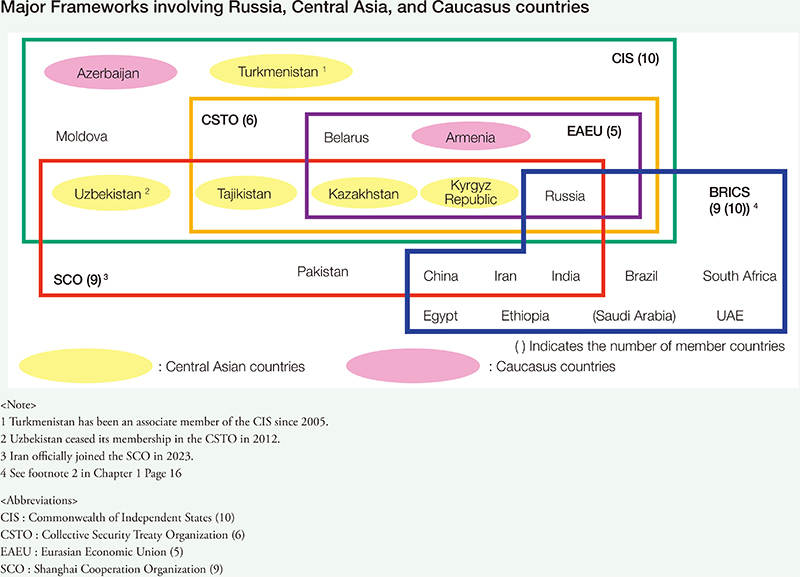Diplomatic Bluebook 2024
Chapter 2
Resilient and Unwavering Regional Diplomacy
3 Countries in Central Asia and the Caucasus
(1) Overview
Countries in Central Asia and the Caucasus are situated in a location of geopolitical importance that connects East Asia, South Asia, the Middle East, Europe, and Russia, and have abundant natural resources such as oil, natural gas, uranium, and rare metals. The stability of the entire region, including Central Asia and the Caucasus, has also been of great importance in addressing key issues facing the international community such as the fight against terrorism and counternarcotics.
In the wake of Russia's aggression against Ukraine that began in 2022, Central Asian and Caucasian countries that have close geopolitical and economic ties with Russia have each been forced to take a cautious approach. The countries of Central Asia and the Caucasus have been absent from or abstained from voting on UN General Assembly resolutions related to the aggression against Ukraine, with the exception of Georgia, which has expressed support for Ukraine, and many countries have avoided making their positions clear externally. Meanwhile, at the nineth Foreign Ministers' Meeting of the “Central Asia plus Japan” Dialogue held in December 2022, Japan and the five Central Asian countries concurred on the importance of upholding the UN Charter and other international laws, which includes respecting the independence, sovereignty, and territorial integrity of all countries and peacefully settling disputes.
Japan and the Central Asian and Caucasian countries have traditionally maintained friendly relations. In 2023, with a return to normal following the COVID-19 pandemic, the flow of people to and from the Central Asian and Caucasian countries increased, including high-level visits between Japan and these countries. Japan is strengthening bilateral relations with these countries through high-level dialogues, including the framework of the “Central Asia plus Japan” Dialogue, which will mark its 20th anniversary in 2024, as it continues efforts to promote regional cooperation.
In addition, in light of the current international situation, the importance of the “Caspian Sea Route,” a transportation route linking Central Asia and Europe via the Caucasus region without passing through Russia, is attracting increasing attention from Central Asian and Caucasian countries as well as Western countries. Japan has also actively participated in discussions on strengthening connectivity in the region. In March, the Twelfth Tokyo Dialogue of “Central Asia plus Japan” Dialogue, whose theme was “Connectivity with Central Asia and the Caucasus,” was held jointly with the Global Forum of Japan6 with the participation of experts from Central Asian and Caucasian countries, international organizations, and businesses.
- 6 Global Forum of Japan: A membership-based voluntary organization for private, non-profit, non-partisan, independent, policy-oriented intellectual international exchange (Source: the Global Forum's website Copyright (C) The Global Forum of Japan (GFJ))
(2) Central Asian Countries
The countries of Central Asia are partners of Japan in maintaining and strengthening a free and open international order, and Japan is promoting diplomacy aimed at contributing to peace and stability in Central Asia.
Japan launched the framework of the “Central Asia plus Japan” Dialogue in 2004, and has held nine Foreign Ministers' Meetings as well as various discussions with the participation of experts and business people. In recent years, the international community has shown increasing interest in strengthening relations with Central Asian countries, and many countries have held summit meetings with Central Asian countries. Japan will also strengthen relations with these regions through high-level dialogues and other means in 2024, the 20th anniversary of the “Central Asia plus Japan” Dialogue (See the Column on page 161).
In Uzbekistan, the constitution was amended in May, extending the presidential term to seven years. In addition, presidential elections were held in July before the end of President Shavkat Mirziyoyev's term, after which he was reelected for the second time. President Mirziyoyev continues to pursue his own reform path. In terms of Japan's relations with Uzbekistan, the Government of Japan has actively engaged in high-level political dialogues that include a visit to Uzbekistan by Parliamentary Vice-Minister for Foreign Affairs YOSHIKAWA Yumi in January, a telephone call between Foreign Minister Hayashi and Acting Foreign Minister Bakhtiyor Saidov in March, a visit to Japan by Deputy Prime Minister Jamshid Kuchkarov in July, and a telephone call between Foreign Minister Kamikawa and Foreign Minister Saidov in October.
Kazakhstan held elections for the Senate in January and for the Majilis (Lower House) in March, both of which were won by the ruling party, indicating that the country's internal political situation is stable. In terms of Japan's relations with Kazakhstan, Parliamentary Vice-Minister for Foreign Affairs Yoshikawa visited Kazakhstan in January, and in September, Foreign Minister Kamikawa met with Deputy Prime Minister and Minister of Foreign Affairs Murat Nurtleu to confirm that Japan and Kazakhstan, which chairs the “Central Asia plus Japan” Dialogue, will work together to coordinate the “Central Asia plus Japan” Dialogues and summit meetings, and discussed ways in which the two countries can deepen cooperation in all areas, including strengthening connectivity and the energy sector.
 Japan-Kazakhstan Foreign Ministers' Meeting (September 20, New York, U.S.)
Japan-Kazakhstan Foreign Ministers' Meeting (September 20, New York, U.S.)With regard to Japan's relations with the Kyrgyz Republic, Parliamentary Vice-Minister for Foreign Affairs Yoshikawa visited the Kyrgyz Republic in August and met with Foreign Minister Zheenbek Kulubaev and Deputy Foreign Minister Rysbek Moldogaziev to discuss ways to strengthen bilateral relations based on the nineth Foreign Ministers‘ Meeting of “Central Asia plus Japan” Dialogue and bilateral foreign ministerial meetings held in December 2022. In November, President Sadyr Zhaparov Foreign Minister Kulubaev, and others visited Japan. As his first visit to Japan, President Zhaparov visited Tokyo and Kyoto, where he held his first summit meeting with Prime Minister Kishida. Prime Minister Kishida confirmed friendly relations with the Kyrgyz Republic, and the two leaders signed the Joint Statement on friendship and comprehensive partnership in the new era between Japan and the Kyrgyz Republic, in which they shared an intention to develop bilateral relations and confirmed cooperation toward sustainable development. On this occasion, they also signed and exchanged notes on the Grant Assistance to the Kyrgyz Republic for the “Project for the Improvement of Irrigation Maintenance Equipment,” exchanged notes verbales on the introduction of diplomatic and official visa waiver measures for diplomatic and official passport holders, and signed memoranda of cooperation between legal authorities and between health authorities.
 Japan-Kyrgyzstan Summit Meeting (November 20, Tokyo; Photo: Cabinet Public Affairs Office)
Japan-Kyrgyzstan Summit Meeting (November 20, Tokyo; Photo: Cabinet Public Affairs Office)With regard to Japan's relations with Tajikistan, the two countries held the second meeting of the “Tajik-Japanese Intergovernmental Commission on Economic, Technical and Scientific Cooperation” in Tajikistan in March. In August, Parliamentary Vice-Minister for Foreign Affairs Yoshikawa visited Tajikistan and met with Foreign Minister Sirojiddin Muhriddin and Minister of Economic Development and Trade Zavqi Zavqizoda, respectively, to discuss strengthening bilateral relations based on the nineth Foreign Ministers' Meeting of the “Central Asia plus Japan” Dialogue and the bilateral Foreign Ministers' Meeting held in December 2022.
In Turkmenistan, the People's Council, the supreme organ of government authority, was established in January, and the parliament reverted from a bicameral to a unicameral structure. In addition, former President Serdar Berdimuhamedov assumed the position of Chairman of the People's Council and the newly created position of “National Leader.” In terms of Japan's relations with Turkmenistan, there was an active flow of dignitaries to and from Japan. In June, State Minister for Digital Transformation OGUSHI Masaki and representatives of the Turkmenistan-Japan Parliamentary Friendship Group attended the opening ceremony of Arkadag, a city built as a smart city. In July, Parliamentary Vice-Minister for Foreign Affairs Yoshikawa visited Turkmenistan and met with the Chairpeson of the Parliament Dunyagozel Gulmanova, Deputy Prime Minister and Minister of Foreign Affairs Rashid Meredov, and Deputy Prime Minister for Economy, Banking, and International Finance Hojamyrat Geldimyradov. Also in November, Minister of Trade and Foreign Economic Relations Begench Gochmollayev attended a meeting of the countries participating in the 2025 Osaka-Kansai Expo in Osaka. In December, an economic mission led by Rahimberdi Jepbarov, Chairman of the Board of the State Bank for Foreign Economic Affairs, visited Japan and held discussions with relevant Japanese ministries and agencies. Furthermore, negotiations for the conclusion of a tax convention between Japan and Turkmenistan, which began in July, resulted in a substantive agreement during the second round of negotiations, which took place in October.
In recent years, there has also been a growing movement among Central Asian countries and neighboring countries to promote regional cooperation. In 2023, there were a number of meetings attended by the leaders of Central Asian countries, including a Shanghai Cooperation Organization (SCO), summit meeting (July), a Commonwealth of Independent States (CIS) summit meeting (October), a meeting of the Organization of Turkic States (November), a Collective Security Treaty Organization (CSTO), summit meeting (November), and a Eurasian Economic Union (EAEU) summit meeting (December). Among the Central Asian countries, the fifth meeting of the Central Asian Leaders Summit took place in Tajikistan in September.
(3) Caucasus Countries
The Caucasus region has a potential to be a gateway connecting Asia, Europe and the Middle East, and geopolitical importance that directly affects the peace and stability of the international community. Meanwhile, problems exist in Georgia over South Ossetia and Abkhazia, and Azerbaijan and Armenia have long been at odds over Nagorno-Karabakh.
Japan announced the Caucasus Initiative in 2018, which is comprised of two pillars: (1) assistance for human resources development for state building (human resources development) and (2) assistance for paving the way to “Appealing Caucasus” (infrastructure development and business environment improvement), develops its diplomacy in line with this initiative.
Regarding the Nagorno-Karabakh issue, Japan has strongly urged all parties to peacefully resolve issues involving the region through dialogue. In 2023, Azerbaijan established a checkpoint along the Lachin Corridor, the only transportation route connecting Nagorno-Karabakh and Armenia, extending last year's restrictions on traffic and logistics along this corridor and raising concerns about a humanitarian crisis.
In September, Azerbaijan conducted military operations in Nagorno-Karabakh, bringing the entire region under Azerbaijani control and bringing more than 100,000 displaced people from the region into Armenia. In foreign ministers' statements and at the UN Security Council and other forums, Japan expressed serious concern about the worsening situation in Nagorno-Karabakh and called for a suspension of military activities by Azerbaijan and a peaceful resolution of the situation for all parties through dialogue. Furthermore, given the large number of displaced persons, Japan decided in October to provide 2 million U.S. dollars in emergency grant aid through international organizations. In December, the Office of the Prime Minister of the Republic of Armenia and the Presidential Administration of the Republic of Azerbaijan issued a joint statement reaffirming their willingness to normalize relations and conclude a peace treaty based on respect for the principles of sovereignty and territorial integrity, and stating that they support a prisoner exchange, the withdrawal of Armenia's candidacy for the 29th Conference of the Parties to the United Nations Framework Convention on Climate Change (COP29) in 2024, and Azerbaijan's holding of COP29, which Japan welcomed as a step toward confidence-building measures aimed at achieving a peace accord between the two countries. These developments have also drawn the attention of the international community to the relationship between Azerbaijan and Armenia.
In terms of Japan's relations with Azerbaijan, Parliamentary Vice-Minister for Foreign Affairs Yoshikawa visited the country in May and met with Minister of Ecology and Natural Resources Mukhtar Babayev, Chairman of the State Customs Committee Shahin Baghirov, and Deputy Foreign Minister Fariz Rzayev, and they concurred on strengthening cooperation with regard to the economy and regional connectivity. In August, the tax convention between Japan and Azerbaijan entered into force and is expected to further promote investment and economic exchange between the two countries.
In terms of Japan's relations with Armenia, Parliamentary Vice-Minister for Foreign Affairs Yoshikawa visited Armenia in May and met with President of the National Assembly Alen Simonyan, Deputy Foreign Minister Mnatsakan Safaryan, and Deputy Minister of the Economy Rafayel Gevorgyan, and they concurred on deepening bilateral relations and working closely together, including with regard to the economy and interparliamentary exchange. In November, Economy Minister Vahan Kerobyan visited Japan and attended a meeting of the international participating countries of the World Expo 2025 Osaka, Kansai held in Osaka, as well as meetings with related ministries.
Regarding Japan's relations with Georgia, Parliamentary Vice-Minister for Foreign Affairs Yoshikawa visited the country in May and met separately with Deputy Prime Minister and Minister of Economy and Sustainable Development Levan Davitashvili and First Deputy Minister for Foreign Affairs Lasha Darsalia to discuss regional developments, including the situation in Ukraine, and to share an intention to promote cooperation in bilateral relations. In December, the European Council decided to grant Georgia candidate country status for EU membership.
 Parliamentary Vice-Minister for Foreign Affairs Yoshikawa visits the No. 13 kindergarten of Etchmiadzin Municipality in Etchmiadzin, Armenia, during her visit to three Caucasus countries (May 3, Etchmiadzin, Armenia)
Parliamentary Vice-Minister for Foreign Affairs Yoshikawa visits the No. 13 kindergarten of Etchmiadzin Municipality in Etchmiadzin, Armenia, during her visit to three Caucasus countries (May 3, Etchmiadzin, Armenia)
Although separated by thousands of kilometers by sea and land, Japan and Central Asia share an Asian climate and culture, and their history of exchange via the Silk Road dates back more than a thousand years. When the five Central Asian countries gained independence from the Soviet Union in 1991, Japan was one of the first to establish diplomatic relations the following year, developing friendly relations among the nations. In 1997, Japan began conducting “Silk Road diplomacy” with three pillars: political dialogue, cooperation for economic and resource development, and peace building.
 Character created by manga artist MORI Kaoru to commemorate the 10th anniversary of the “Central Asia plus Japan” Dialogue
Character created by manga artist MORI Kaoru to commemorate the 10th anniversary of the “Central Asia plus Japan” DialogueIn 2004, Japan launched the “Central Asia plus Japan” Dialogue as a new dimension for cooperation with Central Asia. For Central Asia, it was the first attempt to have a framework for dialogue between the entire region and a third country. The idea was born as an extension of Japan's awareness of the role it could play because of its geographical distance from Central Asia, which is surrounded by major powers, and Japan's proposal was accepted by Central Asia.
At the time, Central Asia was in the midst of prosperity and development, undertaking nation-building efforts that included shifting to a market economy and democratization. At the same time, the region was dealing with localized terrorist attacks and other indicators of instability. Looking at the international environment, following the terrorist attacks on the United States (U.S.) (9/11), the U.S. began stationing its military in Central Asia while Russia and China also worked to maintain and strengthen their influence in the region. Under these circumstances, the stable development of the Central Asian region was very important as it would lead to peace and stability in the international community, including Japan. Furthermore, Japan believed that Central Asia could achieve stability and prosperity quickly and more steadily through intra-regional cooperation than if each country addressed its challenges on its own. With the Central Asian countries playing the main roles, Japan aimed to play a catalytic role in supporting the development of Central Asia based on the three basic principles of “respect for diversity,” “competition and coordination,” and “open cooperation.”
Over the 20 years of the “Central Asia plus Japan” Dialogue, many political dialogues and people-to-people exchanges have taken place, including nine Foreign Ministers' Meetings. During this period, the Central Asian countries have steadily developed. As a result of Japan's long-standing and ongoing support for human resource development, many people are active in their respective fields, and it is not unusual to hear fluent Japanese spoken in government-to-government discussions. The tracks that remain from 20 years of cooperation can be felt.
However, after 20 years, new challenges are emerging. Especially now, with the surrounding international environment growing more severe, the time is ripe for intra-regional cooperation, mainly among the countries of Central Asia. This is the starting point of the “Central Asia plus Japan” Dialogue and is the time for the essence of mutually beneficial cooperation demonstrated through many years of effort to be utilized. Through relationships of trust that have been cultivated over the years, Japan will continue to respect the efforts of each country while redoubling its own efforts to engage with the region as an important partner in achieving free, open, and sustainable development in Central Asia.

